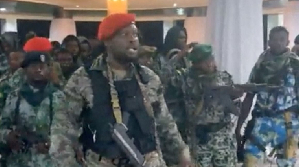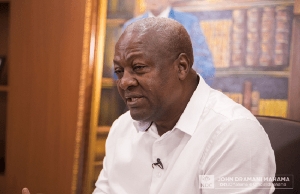Health News of Tuesday, 14 May 2019
Source: ghananewsagency.org
Central Region makes impressive score in malaria vaccination
More than one thousand children under two years have been vaccinated under the new malaria vaccination program being piloted in nine districts of the Central Region.
The Vaccination, which started on Wednesday, May 01, had since received massive patronage despite a trending video and write-ups on social media discouraging Ghanaians from partaking in the exercise.
Speaking at a regional stakeholders forum on post-Malaria Vaccine Implementation Programme(MVIP)launch in Cape Coast on Thursday, Dr. Kwabena Sarpong, Regional Deputy Director of Public Health, however, lamented that three persons refused the vaccine due to the misinformation.
He added that: "We are not considering the three likely due to the influence they could have on other friends and families to swell up the number."
He announced that the Ghana Health Service was targeting over 40,000 children annually in the Region and between 120,000 to 150,000 children in the three regions to take part in the pilot.
The programme on the theme: “Malaria vaccine is safe and offers additional protection,” is being conducted in the Cape Coast North, Assin North, Abura-Asebu-Kwamankese, Asikuma-Odoben-Brakwa, Ajumako-Eyan-Essiam, Awutu Senya, Agona East, Ekumfi, and Gomoa West.
According to Dr. Sarpong, the (RTS, S Vaccine) has gone through various trials for more than 30 years and approved by the World Health Organisation (WHO) and the Ghana Food and Drugs Authority (FDA).
The vaccine, which would require a four-dose regiment, would be administered based on age and given to children who are six, seven, nine and 24 months, not only in Ghana but Kenya and Malawi.
He expressed regret that despite numerous malaria control and prevention interventions in place, Ghana was counted among the top 20 malaria burden countries around the globe.
For his part, Dr. Alexis Nang-Beifubah, the Regional Health Director, GHS, said the new malaria vaccine had emerged as an additional tool for protection against malaria disease in children less than 2 years after years of clinical research and trials across several countries across the world.
He said malaria accounted for significant levels of diseases and deaths, particularly in children less than five years and in pregnant mothers across countries particularly in sub-Saharan Africa, which included Ghana.
According to him, Ghana accounted for about 40 percent of the total number of malaria cases worldwide in the year 2016 alone, which translated to over 10 million episodes, 380,000 admissions, and 1,260 deaths, particularly in children less than five years.
Touching on the social media rumours about the efficacy of the vaccine, he stated that it was very unfortunate and dangerous because it had the potential to erode the gains chalked over several years of hard work and significant investments with respect to the vaccine.
"Let me state here clearly for the records. The Malaria Vaccine is very safe and does not kill, maim, or cause any disabilities in children. The assertions and allegations about the vaccine are totally baseless, unfounded, and not supported by the scientific evidence available."
"There is no way our state institutions and agencies will allow unsafe products or vaccine to be introduced into our health care delivery system," he assured.
Mr. John Odai Tettey, the Regional Director of the Food and Drugs Authority (FDA), also denied the misinformation about the efficacy of the malaria vaccine, which had been monitored by FDA and collaborated with relevant Agencies for years of clinical trials, adding that "the FDA will not relent on its mandate to ensure safety of all medicines and vaccines".
He rallied the support of all to make it a success.
To further drum the essence of the vaccination exercise, the stakeholders were treated to beautiful cultural displays amidst the answering of wrangling questions about the vaccine.
Earlier, the stakeholders matched through the principal streets to educate and distribute leaflets, flyers and held placards some of which read "clean environment prevent malaria", visit the nearest hospital for vaccination", do not be deceived, get your child vaccinated", get your child vaccinated with the right doses" among others.











